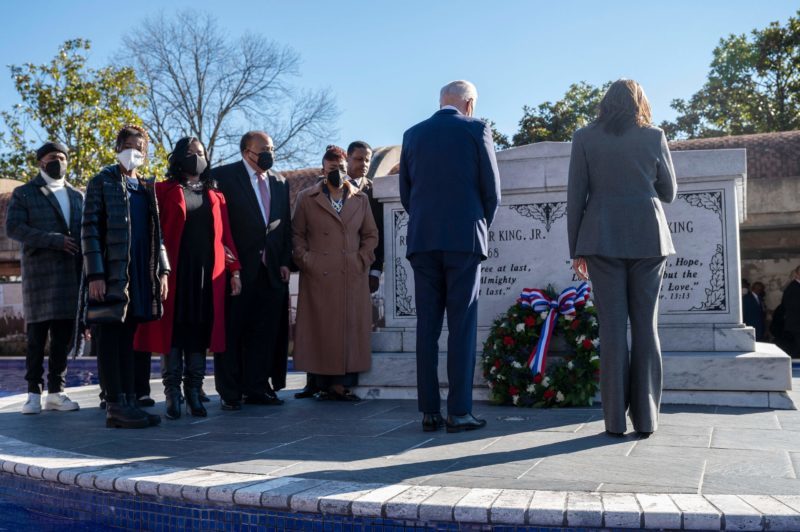
Although much more work remains, the current Administration has made historic progress in advancing equity.
Last week, President Joseph R. Biden and Vice President Kamala Harris spoke in Atlanta to garner support for the John R. Lewis Voting Rights Advancement Act of 2021, which must pass in the U.S. Senate before it can become law. Some Black Americans, though, do not believe that the President has expended enough political capital to get the voting rights bill through the U.S. Senate, especially as voter suppression laws spring up in states across the country.
Indeed, many of the Georgia activists who mobilized voters for the 2020 election boycotted the President’s speech in Atlanta because they do not believe that the President has “done enough to advance matters of racial equity, particularly voting rights.” Voter protection stands as a core pillar of American democracy, and as midterm elections approach, “justice too long delayed” could ultimately result in “justice denied.”
Much the same could be said of the pursuit of improved justice in policing. The George Floyd Justice in Police Act, which has passed in the House of Representatives, awaits Senate approval.
But a focus on stalled legislative efforts need not lead the public to overlook how, in other key areas, the Biden Administration has made tangible strides to promote equity through executive action and earlier legislation. As Marc Morial, the President and CEO of the National Urban League, has noted, President Biden has done historic work to support Black Americans, but this work has not received broad attention.
One of the President’s first executive orders directed every federal agency to address the lasting impacts of systemic racism on Black communities, advance racial equity, and support underserved communities. As Vice President of the Joint Center for Political and Economic Studies, Jessica Fulton, has said, an acknowledgment from the U.S. government that it needs to tackle racial equity is “actually a very big deal.”
President Biden also led the way by following through on his promise to appoint one of the most diverse cabinets in U.S. history.
The U.S. COVID-19 relief package, the American Rescue Plan Act, increased economic opportunity for Black Americans through efforts such as additional funding to social safety net programs and federal support and investment in Black-owned businesses. The plan provided cash relief for low and middle-income Americans, which cut Black child poverty by 40.1 percent. This relief lifted approximately 420,000 Black children out of poverty between June and July 2021 and was estimated to cut the Black child poverty rate by more than 50 percent in 2021.
In addition, the American Rescue Plan provided Historically Black Colleges and Universities (HBCUs) with $3.7 billion in pandemic relief, and 45 HBCUs received $1.6 billion in debt relief.
The Biden Administration has also bolstered educational equity through a series of administrative actions. For example, in September, President Biden issued an executive order establishing the “White House Initiative on Advancing Educational Equity, Opportunity, and Excellence through HBCUs.” This initiative will support HBCUs by eliminating systemic barriers that impede their participation in federal programs.
In October, President Biden issued another executive order launching a White House Initiative to advance educational equity, excellence, and economic opportunity for Black Americans, designed to dismantle entrenched disparities that “continue to plague America’s education system.”
The Biden Administration has also aimed to reduce health disparities. For example, the American Rescue Plan included healthcare initiatives around Black maternal health and an equitable COVID-19 response.
The Biden Administration has also implemented criminal justice reforms. In September, the U.S. Department of Justice banned the use of chokeholds and carotid restraints by federal law enforcement officers except where deadly force is necessary and imposed new restrictions on no-knock warrants.
These uses of police force have resulted in the deaths of unarmed Black Americans, including Eric Garner, who was killed in an NYPD officer’s chokehold, and Breonna Taylor, who Louisville police officers killed in her home while executing a no-knock warrant. Of course, although the Justice Department’s new policy is meaningful, it does not apply to state law enforcement officers, so Congress must still pass the George Floyd Justice in Police Act to implement these reforms nationwide.
Even with respect to voting rights, despite Republican opposition to a federal voting rights law, the Biden Administration has taken action to use executive power to aid in voter protection. The Justice Department, for example, has doubled its staff dedicated to voter protection, so the government can bring more cases like the ongoing lawsuit against Georgia for voting laws that target the Black voters. President Biden also issued an executive order to leverage the resources of the federal government to provide access to voter registration.
Overall, the Biden Administration has taken numerous policy actions that seek to advance equity and opportunity for “Black people and communities across the country.” Many of these initiatives address high-priority policy issues for Black Americans.
Two summers ago, millions of Americans protested nationwide for structural anti-racist reforms and hoped that a new administration would usher in this change. Many Black Americans believe, as Dr. King did, that “justice for Black people cannot be achieved without radical changes in the structure of our society.” A recent Pew study found that 58 percent of Black adults say most of the nation’s laws and major institutions need to be completely rebuilt compared to 18 percent of white adults.
Still, as the United States becomes more divided along racial and political lines, radical change proves increasingly difficult. It is too early to tell whether this Administration will have a lasting structural impact on racial equity in the United States.
For now, the Biden Administration says that fulfilling its objectives for voting and policing bills remains a priority and it boasts of additional equity efforts that could be achieved with the passage of the Build Back Better plan. Indeed, last week in Atlanta, President Biden, referring to the Voting Rights Act, asked a simple question of the nation’s public officials: “Do you want to be on the side of Dr. King, or George Wallace?”
If Dr. King’s words from a Birmingham jail shed any light on the Administration’s current political impasse with Congress, “progress never rolls in on wheels of inevitability” but requires “tireless effort.”



